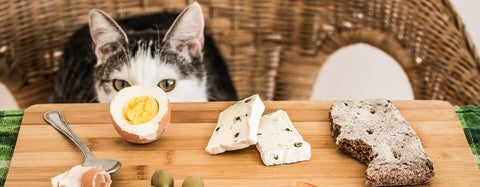Are vegetables suitable for your cat's diet, or should they be avoided altogether? Recognizing that cats are obligate carnivores underscores the importance of prioritizing meat for optimal health. While vegetables contain fiber and carbohydrates necessary for humans, they aren't nutritionally appropriate for felines, which primarily require protein and fat.
Feeding your cat a vegan diet is strongly discouraged due to their unique dietary needs. Their digestive tract is specialized for processing meat, making it fundamental to their nutritional needs. Introducing vegetables into their diet may be ineffective and pose risks, as some veggies are toxic to cats.
To ensure your cat's diet meets their nutritional requirements, it's crucial to understand which vegetables are safe and should be avoided. Untamed provides comprehensive guidance on crafting a tailored meal plan for your furry companion, helping you prioritize their health and well-being.
Vegetable Cats Can Eat
Cats derive essential nutrients, including vitamins and minerals, primarily from meat and fish sources. While vegetables offer commendable nutritional value for humans, they aren't as beneficial for felines. While not essential, some vegetables may aid digestion and promote healthy bowel movements in cats, making them suitable occasional snacks.
Are you curious about which vegetables are safe for your feline friend? Let's explore some cat-friendly options!
Broccoli
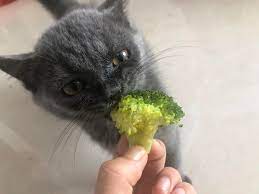
Cooked broccoli, mainly steamed, is considered safe for cats. Rich in antioxidants, this vegetable can complement a diet primarily focused on protein sources.
Incorporating broccoli into your cat's meals can support regular bowel movements and relieve digestive discomfort. However, it's crucial to prepare it correctly by cooking and allowing it to cool. Gentle steaming is an ideal method as it helps retain the maximum nutritional value of the broccoli while also making it easier to digest due to its softened texture.
Remember that broccoli should be given to your cat sporadically, not as a staple in their daily meals.
Overconsumption may result in digestive issues such as diarrhea, so moderation is key when introducing broccoli to your cat's menu.
Pumpkin
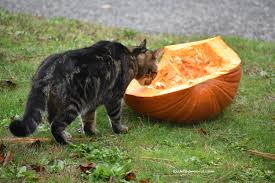
Incorporating small portions of cooked pumpkin into your cat's diet could alleviate issues related to constipation. Certain veterinarians suggest integrating pumpkin into a cat's food regimen, especially if they experience gastrointestinal sensitivity and frequent indigestion.
However, it's crucial to properly prepare the pumpkin before offering it to your feline companion. Ensure the pumpkin is cooked thoroughly, removing any seeds beforehand to prevent choking hazards. Consider chopping the vegetable into small, manageable pieces or preparing a pumpkin puree to mix into your cat's food occasionally, provided they enjoy it.
Peas
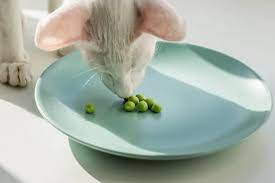
Peas are typically deemed safe for feline consumption and are frequently incorporated into commercial cat food formulas as supplementary ingredients. However, it's essential to exercise moderation when offering peas to your feline companion. While some nutritionists argue that peas can support a cat's digestive system and promote healthy bowel movements, overconsumption may lead to diarrhea.
To prevent any potential digestive issues, limiting the amount of peas given to your cat and excluding them from their diet entirely if they're already present in their food is advisable. Additionally, it's crucial to cook peas thoroughly before feeding them to your cat, as this can help enhance their digestibility.
It's worth noting that peas are not recommended for kittens, so they should only be served to adult and senior cats. By being mindful of portion sizes and preparation methods, you can ensure that your cat enjoys the occasional serving of peas without any adverse effects.
Cucumber
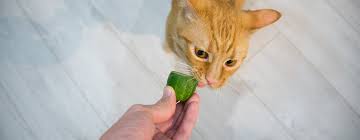
Certain veterinarians propose that cucumbers can be a valuable source of hydration for cats. Cucumber stands out as one of the rare vegetables that cats can safely consume in its raw form. Still, taking precautions such as peeling off the skin and ensuring thorough washing before offering it to your feline friend is essential.
When introducing cucumber into your cat's diet, it's best to do so in moderation and limit the serving size to small amounts. Overindulgence in cucumber may lead to digestive issues such as diarrhea, so carefully monitoring your cat's intake is crucial.
By incorporating cucumber into your cat's occasional treats and maintaining portion control, you can provide them with a refreshing and hydrating snack without risking any adverse effects on their health.
Carrot
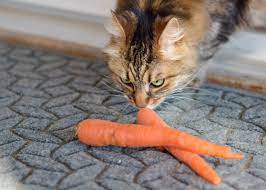
For feline safety, it's important to note that cooked carrots are generally considered safe for cats, while raw carrots pose a choking hazard. If you choose to offer carrots to your cat, it's crucial to prepare them blandly. After boiling or steaming the carrots, allow them to cool adequately before presenting them to your furry companion.
Carrots boast a rich nutritional profile, containing vitamins A, K, B6, potassium, and fiber. While some cat owners incorporate shredded cooked carrots into their pets' regular meals, it's essential to recognize that there's a lack of conclusive studies demonstrating significant benefits for cats from consuming this vegetable. Thus, while carrots can be offered as an occasional addition to your cat's diet, their primary nutritional needs should still be met through appropriate cat food formulated to meet feline dietary requirements.
Asparagus
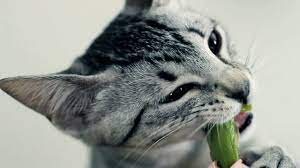
Asparagus is among the vegetables that cats can consume, and interestingly, it may deter them from nibbling on houseplants. Some veterinarians suggest that asparagus could assist in alleviating symptoms of an upset stomach, including diarrhea or constipation, thanks to its fiber content. However, it's essential to exercise caution with the amount given, as excessive consumption can lead to gastrointestinal and urinary issues.
To ensure safety, cooking asparagus thoroughly before offering it to your feline friend is crucial, as raw asparagus presents a choking hazard. Despite its potential benefits, it's important to note that asparagus is highly alkaline. Consuming large quantities may compromise your cat's immune system and disrupt healthy bacteria levels in their urinary tract, potentially predisposing them to infections. Therefore, moderation is key when incorporating asparagus into your cat's diet.
Zucchini
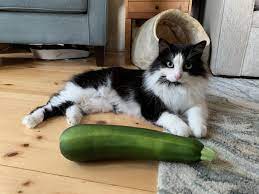
Zucchini offers a low-calorie option for your cat, while its high water content can provide hydration without risking their health. However, it's important to remember that zucchini should be considered an occasional treat rather than a daily dietary staple for your feline friend.
To ensure its safety for consumption, always cook the zucchini thoroughly and allow it to cool before offering it to your cat. By incorporating properly prepared zucchini into your cat's occasional snacks, you can provide them with a refreshing and nutritious treat without any adverse effects on their well-being.
Potatoes
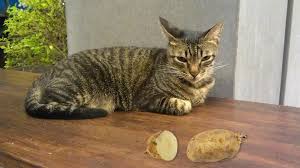
Although potatoes are not inherently toxic to cats, they don't offer significant nutritional benefits to felines. Therefore, there's no necessity to incorporate potatoes into your cat's diet. However, if you choose to provide potatoes to your cat, it's crucial to ensure they are thoroughly cooked and devoid of any seasoning.
Since potatoes are high in carbohydrates, they should only be considered an occasional treat for your cat rather than a staple in their regular meals. It's important to note that fried potatoes, in particular, can pose health risks and contribute to cat obesity. Thus, it's best to refrain from giving fried potatoes to your feline friend to maintain their overall well-being.
Corn
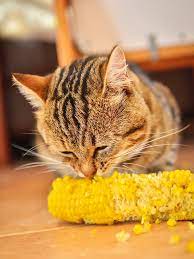
Corn is a commonly used filler in some cat food formulations by manufacturers. While it's generally considered safe for cats to consume, it's important to note that cats derive minimal nutritional benefits from corn. When selecting cat food, it's advisable to prioritize products with meat as the main ingredient rather than relying on inadequate substitutes like corn. You can ensure your cat receives the essential nutrients for optimal health and well-being by opting for meat-centric options.
Lettuce
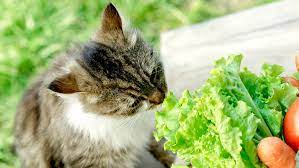
According to specific feline nutrition experts, lettuce is primarily composed of dietary fiber, which can aid your cat's digestion or alleviate constipation when consumed in small quantities.
However, it's crucial to exercise caution with the amount of lettuce given to your cat, as excessive intake can lead to diarrhea. To prevent this, it's recommended to limit lettuce servings to a tiny portion per week for your furry companion.
To mitigate the risk of choking, it's advisable to finely chop the lettuce into manageable pieces before offering it to your cat. Unlike some vegetables, lettuce doesn't require cooking to be safe for feline consumption. Various types of lettuce, including Iceberg, Leaf, and Romaine, are safe options for cats to enjoy as occasional treats.
Spinach
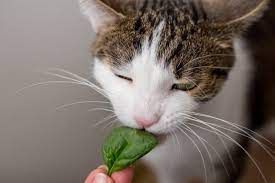
While spinach can be deemed safe for cats, it's essential to consider their urinary tract health before incorporating it into their diet. Spinach contains calcium oxalate, which may exacerbate urinary tract issues by contributing to the formation of struvite crystals. Symptoms of such conditions may include bloody urine, painful or frequent urination, spraying, and excessive licking of the genitals.
However, if your cat has a clean bill of urinary health, feeding them spinach in moderation should pose no significant risks. As with any new food introduction, starting with small amounts, you should gauge your cat's reaction and monitor for adverse effects.
Vegetable Cats Can Not Eat
Certain vegetables pose such a significant toxicity risk to cats that even the most minor ingestion can result in severe poisoning and potentially fatal consequences. If you suspect that your feline companion has consumed any of the following vegetables, it's crucial to seek immediate veterinary assistance:
Garlic
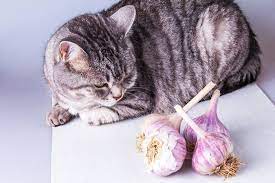
Garlic is the most toxic to cats among allium vegetables due to its ability to destroy red blood cells. Ingesting even a small amount, such as a single clove, can result in hemolytic anemia and severe gastroenteritis in cats. Failure to promptly treat these conditions can lead to substantial organ damage and potentially fatal outcomes. If you believe your cat has consumed garlic, it's crucial to promptly seek veterinary assistance to minimize potential harm and safeguard your cat's health.
Tomatoes
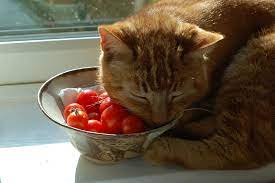
Tomatoes harbor solanine, a natural pesticide that is highly toxic to cats. Even through cooking, solanine levels in tomatoes remain unchanged, making them unsuitable for feline consumption. It's essential to refrain from feeding your cat tomatoes in any form, including sauces and soups that contain this vegetable.
If your cat accidentally consumes a piece of tomato, monitoring them closely for the next 24 hours is crucial. Be vigilant for any signs of the following symptoms, which may indicate toxicity, and promptly seek veterinary care if observed:
- Vomiting
- Lethargy
- Excessive drooling
- Disorientation
- Diarrhea
- Appetite loss
- Dilated pupils
Onions
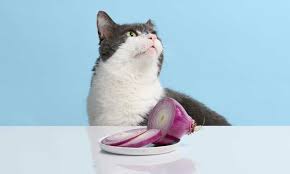
Due to their toxicity, onions pose a significant threat to cats in all forms, whether raw, cooked, or powdered form. The compounds in onions can attack and break down feline red blood cells, leading to severe consequences that could prove fatal without prompt treatment. Be vigilant for the following signs of onion toxicosis:
- Diarrhea
- Fainting
- Bloody urine
- Elevated heart rate
- Vomiting
- Lethargy
- Anemia
Avocados
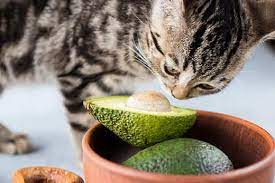
While avocados may be a trendy and healthy snack for humans, they can present issues for cats. The high fat content in avocados is unsuitable for feline consumption and can lead to digestive problems. Additionally, the seeds of avocados pose a choking hazard and may also cause intestinal obstructions in cats. It's important to avoid offering avocados to your feline friend to ensure their well-being and prevent potential health complications.

